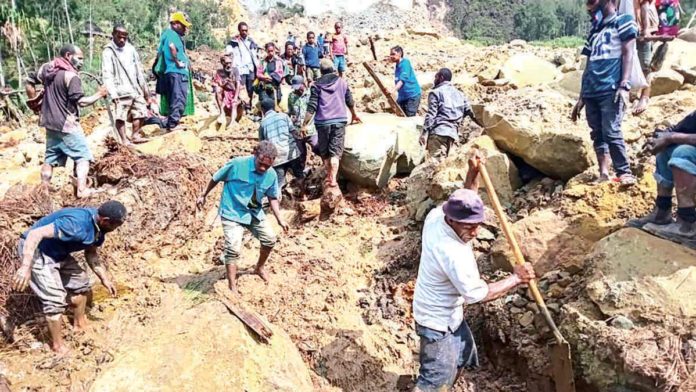
PORT MORESBY – A deadly landslide which villagers in Papua New Guinea say struck like “an exploding bomb” may have buried more than 2,000 people alive, a government agency fears.
The figure – provided by the acting director of the country’s National Disaster Centre – is far higher than the 670 the United Nations (UN) suggested over the weekend.
Exact casualty figures for the disaster, which tore through the village in the early hours of Friday, have been difficult to establish.
Desperate attempts to rescue survivors or remove bodies from the rubble have so far been hindered by rubble 10 meters deep in some places, blocked access and a lack of adequate equipment.
But on the ground, hopes are fading for the mountain residents swept up in the disaster in Enga province.
“Nobody escaped. We don’t know who died because records are buried,” a schoolteacher from a neighboring village, Jacob Sowai, told news agency AFP.
Standing in the wreckage of the disaster – which extends for close to a kilometre – Evit Kambu said she felt helpless.
“I have 18 of my family members buried under the debris and soil that I am standing on, and a lot more family members in the village I cannot count,” she told the Reuters news agency.
Lasen Iso told local newspaper The National it had struck “like an exploding bomb in a split second”, while Eddie Peter said she watched it rush towards her home “like a sea wave”.
“My husband turned back as our four children were sleeping. I fled and they were all trapped and killed,” she told the newspaper.
About 3,800 people had been living in the area prior to the disaster.
The letter by the National Disaster Centre’s Lusete Laso Mana said the damage was “extensive”, and that it had “caused major impact on the economic lifeline of the country”.
On Monday Britain’s King Charles III, who is also head of state of Papua New Guinea, sent his and the Queen’s condolences.
He added that he had “great admiration for the extraordinary resilience” of the country’s people, which he had witnessed himself at first hand.
“I have faith that your communities will come together to support the survivors and the recovery in these heartbreaking circumstances,” his statement on X read.
Prime Minister James Marape has expressed his condolences and ordered the country’s defence force and emergency agencies to the area, about 600km north-west of the capital Port Moresby.
But locals in the affected Kaokalam village say they are still waiting for officials to step in with larger rescue operations.
A community leader who visited the site told the BBC locals felt they had been left to fend for themselves. They were using shovels and their bare hands to try and dig people out.
“It’s been almost three to four days now but [many] bodies are not located yet. It is still covered by the landslide and people are finding it really hard to dig them out – they are calling for the government for support and help,” Ignas Nembo told the BBC’s Newshour programme.
However, a police official from the province told the BBC he had seen soldiers arrive at the scene and they were attempting to remove boulders to try and free those trapped.
Acting Provincial Police Commander Martin Kelei described these efforts as precarious – as removing car-sized boulders and other large barriers risked further rock slips.
“Digging is very hard at the moment because we’re worried about further landslides and deaths – so local people are only digging from where they can see it is safe. We are trying to identify wherever we can see that people are buried,” he said.
He had visited the site several times since Friday’s collapse and claimed survivors could still be heard calling for help under the rubble.
Local media reported one couple being pulled alive from under rocks. They had survived as their home only caught the edge of the landslide’s onslaught.
They were saved after rescue workers heard their shouts for help, the local NBC channel reported.
Remaining residents are being evacuated as the region remains high-risk amid forecasts of further rain.
“The ground is also quite unstable at the moment and it is at risk of triggering further landslide,” said Justine McMahon, the country co-ordinator of Care Australia, one of the humanitarian aid agencies on the ground.
“We’ve decided to stay out for now to allow the authorities time to properly assess the situation to conduct the rescue and recovery operations.”
Earlier, an official for the UN’s migration agency in the country had also described to the BBC the difficulties around the rescue.
Serhan Aktoprak from the International Organization for Migration said there were a number of challenges facing teams trying to recover bodies, including reluctance by some grieving relatives to let heavy machinery near their loved ones.
Instead, he said, “people are using digging sticks, spades, large agricultural forks to remove the bodies buried under the soil”.
Crews at the scene also say rescue efforts are being hindered by major damage to the sole road leading to the town. The landslide has damaged a length of about 200m (650ft), Ms McMahon said.
The Mount Mungalo landslide occurred in the highlands of Enga, in the north of the island nation.
Local officials and reporters have attributed the mountain’s collapse to weeks of heavy rain and other wet conditions in the area. (BBC)







